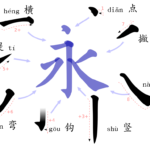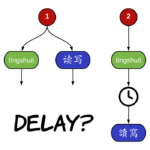Articles in the ‘Distinctively Chinese’ category Page 8
-
Should you learn the names of the strokes in Chinese characters?
Some teachers insist on teaching the names of the strokes that make up Chinese characters, but is learning them worthwhile or just a waste of time?
Read → -
How to not teach Chinese characters to beginners: A 12-step approach
This is a guide for how to not teach Chinese characters, based on more than a decade of observing terrible teaching and worst practices. Which of these have you seen?
Read → -
The key to unlocking your first semester of Chinese
A new semester is around the corner and many people are setting out on their journeys to learn Chinese. This article summarises the most important advice that beginners should keep in mind, including what resources to use and how to learn characters and tones.
Read → -
Review: The Outlier Dictionary of Chinese Characters
Outlier Linguistics Dictionary of Chinese characters is an excellent tool to help you understand and thereby learn Chinese characters more effectively. This is an in-depth review, covering the two versions of the dictionary, essential and expert, as well as other related products provided by outlier. There is also a 25% discount code for those who want to try the dictionary!
Read → -
All the resources you need to learn and teach Chinese stroke order
Stroke order for Chinese characters is something most beginners struggle with to begin with, but it’s also a problem that quickly fades away over time. This article collects all the resources you need to understand stroke order, look it up when you need to, and provides you with the practice you need.
Read → -
Should you learn to speak Chinese before you learn Chinese characters?
The question of whether or not to delay learning Chinese characters in favour of the spoken language is an interesting one many arguments in favour of both approaches. For most people setting out on their Chinese learning journey, focusing on important aspects of the spoken language, such as pronunciation, is certainly more important than learning characters.
Read → -
Chinese is fascinating and exciting, not weird and stupid
Languages are neither negative or positive in themselves; it’s all in the eye of the beholder. But does it matter what you think about Chinese language and culture? Is it harder to learn Mandarin if you think the language is weird and stupid? This article looks closer at this question, and argues that deliberately adopting a positive approach will lead to better and more enjoyable learning.
Read → -
Dealing with Chinese characters you keep mixing up
The more Chinese characters you learn, the harder it becomes to keep similar characters distinct. If you’re not careful, a pair or group of characters can generate a lot of extra work and frustration. The solution is to trace your errors and figure out why you get the characters wrong and, then deal with them decisively!
Read → -
5 levels of understanding Chinese characters: Superficial forms to deep structure
How much do you need to care about the actual composition and meaning of a Chinese character when learning it? In general, better understanding means it’s easier to learn, but is there a limit to how closely you should stick to actual etymology? This article explores the spectrum from using superficial images to real etymology from the perspective of a language learner.
Read → -
Does using colour to represent Mandarin tones make them easier to learn?
Some learning materials, apps and tools allow you to add colours to show Mandarin tones, but is this really helpful? This article discusses the ins and outs of using colour to learn and remember tones, along with some practical considerations.
Read →









